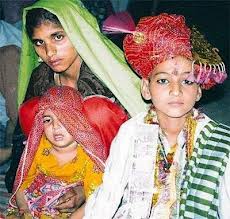Report by Human Rights Watch says government has not acted on pledges to end child marriage made by Prime Minister Sheikh Hasina last year
Child marriage in Bangladesh is an epidemic and requires the government to act on its promises to tackle the problem, according to Human Rights Watch (HRW).
Bangladesh has the fourth highest rate of child marriage in the world, behind Niger, Central African Republic and Chad. The UN children’s agency, Unicef, estimates that in 2011, of women aged between 20 and 24, 65% were married before the age of 18, and 29% before they turned 15.In its 134-page report, Marry Before Your House Is Swept Away, published on Tuesday, HRW welcomed the government’s commitment to end child marriage, but said little action had followed pledges to end the practice made by the prime minister last year. It added that attempts to change the law on child marriage threatened to make the situation worse.
The prime minister, Sheikh Hasina, promised to end child marriage of under-15s by 2021 and reduce by more than one-third the number of girls married between the ages of 15 and 18, with the ultimate goal of eliminating the practice by 2041. The legal age of marriage in Bangladesh is 18 for women and 21 for men.
Attempts to revise the Child Marriage Restraint Act (CMRA) have sparked concern among civil society groups. While welcoming tougher penalties for those who perform or allow child marriage, draft proposals issued last year include lowering the age of marriage for women to 16 and men to 18.
Plan International Bangladesh, Save the Children and HRW are among the groups that have called on the government to keep the minimum age of marriage for girls at 18. Last year, former UN secretary general and chairman of the Elders group of global leaders, Kofi Annan, wrote to Hasina urging her not to go ahead with the planned revisions.
For its report, HRW interviewed 114 people, including 59 girls and young women who were married before they were 18 in the past five years. The youngest married girl interviewed was 10 years old. Parents and local officials also took part in the research, which was conducted in five districts between September and November last year.
Poverty was given as the main reason girls were married off at a young age, a situation compounded by the country’s vulnerability to natural disasters, said HRW. Girls are often seen as a financial burden on their families until they are married and live with their husbands, and are more likely than boys to be pulled out of school when money is tight, said the report.
“We were very poor. Sometimes we would eat every two or three days,” 15-year-old Lucky C told researchers. “Even though they [parents] really wanted all three of their daughters to study, it wasn’t possible – so they got me married.” Her older sisters married at 11 and 12.
Shahana C, who was married at 14, told HRW: “My parents couldn’t feed me so they decided to get me married, so I had no choice.”
“Child marriage is an epidemic in Bangladesh, and only worsens with natural disasters,” said Heather Barr, senior researcher on women’s rights. “TheBangladesh government has said some of the right things, but its proposal to lower the age of marriage for girls sends the opposite message. The government should act before another generation of girls is lost.”
HRW is calling on the Bangladeshi government to set a minimum age for marriage for both girls and boys at 18, to publish its action plan to end child marriage, and to better support married children, or adults who were married as children. It also calls on the government to launch a national awareness campaign against child marriage, introduce compulsory marriage registration for all religions, improve efforts to expand birth registration and investigate system abuses, and tackle the drivers of child marriage by, for example, minimising school costs.
The organisation has not received a response from the government to its report.
In November last year, the UN passed a resolution urging all countries to enact and enforce laws to prevent child, early and forced marriage.
A target to eliminate child marriage is expected to be included in the next set ofsustainable development goals, which are due to be adopted in September. – HRW.the guardian, UK




